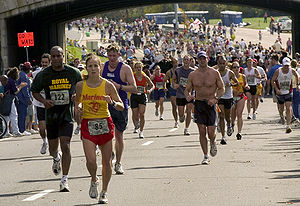
Image via Wikipedia
I sit here one week out from running marathon #6 suffering from a very familiar feeling of immense apprehension. Strike that, let’s call it what it is: fear. Truth be told, the marathon scares me. Don’t get me wrong, I love the race, and I love the distance, but the feelings of self-doubt that are now running through my head seem nearly impossible to ignore. I think about all of the things that can go wrong: will my fueling be sufficient, will the weather cooperate, was my training enough, can I even hold my desired pace? I fear letting my friends and supporters down – lots of people have assured me that a BQ will come, but me, I’m just not that confident. One would think that experience should have banished some of these thoughts, but alas, here I am – one week until I run the Hampton Smuttynose Rockfest Marathon, and I’m already feeling the butterflies awakening in my gut.
Perhaps moreso than anything else, I fear “the wall.” I have run headlong into the wall in four of my five marathons to date, and in no case has it been pleasant. The feeling of a smooth stride devolving into a pained shuffle is one that I cannot forget. Memories of the energy rapidly draining from my body make me tremble. The thought of a colossal bonk preventing me from reaching my goal of a PR or even maybe a BQ is ever-present when I am out training on the road. I’d like to think that these feelings are common, but I don’t know. I just know that they are common for me.
Despite my fears, I have learned a thing or two over my five previous 26.2 mile races. I now understand the importance of proper pacing – if I go out too fast and try to hold on, I’m going to be toast. Disney Marathon 2010 taught me that, as my negative split from the first to second half result in a big PR and my fastest miles occurred in the final six. I have learned that fueling well is important, and that over-hydrating prior to the race can be problematic with respect tip bio-breaks. I have learned that having a relaxed approach to a race can be beneficial – I won’t be poring over course maps and elevation profiles this week – I plan to just take what happens as it comes.
Despite all of these lessons learned, I still worry about how I will do. I’m confident I can avoid the wall if I run negative splits or chug along at a relatively steady pace. The problem is how to know what pace that is? Should I go out at 7:28min/mile BQ pace and risk an inevitable crash since my training has been erratic this summer due to baby related time constraints? Should I just run the race with my friends at a slightly slower pace with the sole goal of having fun and trying to pick up a new PR? How will the cold that nailed me this week and caused me to take four days off affect me? How will my retooled stride hold up over the distance? I’m very comfortable with my midfoot form now, but still don’t think my muscles have fully adapted to the extent that I would like (my calves are now good, but my quads need some more work since they bear more of the brunt of shock absorption now that it has shifted from my leg bones and heel).
As with most of my running experiences, I know the answers to many of these questions somewhere deep down. I know that I am incapable of holding back from shooting for a goal – I’ll probably start the race with my friends, and if feeling good after a few miles make an attempt on the BQ even if it is an unwise choice that will lead to a crash. I want to say that I’m going to go out and rock it, and maybe I will, but self-doubt lingers and is hard to overcome. When I return home after the race, I know that my kids will ask me if I won – they always do. As long as my response is that I did my best and gave it my all, I guess there’s nothing to be ashamed of. I just wish I could content myself with that feeling going in!
How about you? Do you suffer from these same feelings of self doubt with your running? If so, any tips on how to deal with them?
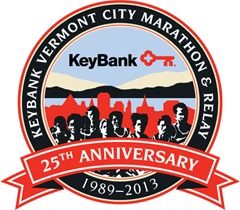
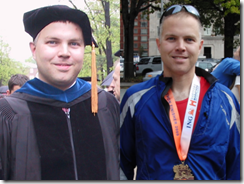
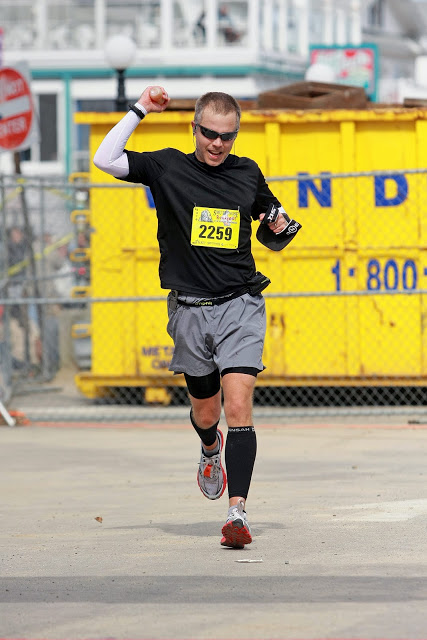
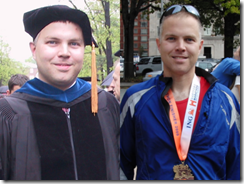
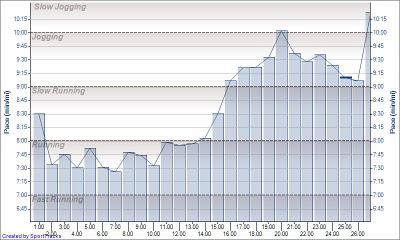














If you weren’t afraid, it would be boring, wouldn’t it? 26.2 miles with no knot in your stomach. What a snore. ;)
check out this negative split chart link to feelrace.com…
I think you need to concentrate on all the positive stuff and put the rest out of your mind, there are so many things you could worry about, but whats the point.
just go out and do your best, you can do no more.
Peter, My advice (17 marathons of experience, sub 2:30 4 times) if you want to follow it says run at qualifier pace or slightly slower for more than the first half. You say you have had an erratic summer of training so you know that caution is a better plan than being bold. If you feel good, you can always finish strong – anywhere after -18 miles/30 kilometers . Your experience of hitting the wall is prior marathons should be a lesson learned in what to do right this time. Be calm, it is a wonderful event. Best.
Walt,
Thanks for the advice – that’s probably exactly what I will try to do. We’ll
see how it goes!
Pete
Nerves affect me *every one* of my marathons. Positive visualization helps me somewhat, but I still tend to obsess.
Regarding your target pace if we were three weeks – versus one – prior to your goal race I’d recommend establishing a recent benchmark of your current fitness level’s reasonable marathon finishing time via averaging ten Yasso 800’s (with 0:03:30 slow run between), then adding three minutes. Example: Say your average of ten 800’s was 0:03:30. Then I’d expect a reasonable marathon goal of 03:33:00. However, it’s too close to the marathon to push yourself in that way. So, I’d recommend setting your twenty pace at your current marathon P.R. pace. In the final 10K I’d recommend speeding-up somewhat, in which case while you won’t BQ you’d P.R. – which I’d be delighted with. Regarding running with your friends unless they’re following *your* plan (highly unlikely!) I’d instead look ideally for a marathon pacing team who happen to have your target pace. Good luck!
Mark,
I ran a half marathon distance training run in late August in 1:34:55, which
is the closest thing I have to a benchmark to go by right now. That predicts
a marathon time of roughly 3:18 according to Daniels. I have done a 20 miler
and a 19 miler since then. I need a 3:15:59 for Boston – I’m close, so hence
my dilemma!
Pete
Pete – Sorry, you are indeed very close to your BQ, which I didn’t appreciate. In that case join the 3:15 pacing group it’s offered. If it’s not rely on your running watch split function targeting a 7:26 average pace (be cautious though relying excessively on your Garmin’s calculated average pace since the GPS’ measured overall distance will be closer to 26.5 miles). Given your past history of hitting the wall have you tried stepping-up your consumption of Gu somewhat? (FWIW, see my on-topic post at link to bit.ly)
Hampton should be one course you don’t need to worry about an elevation chart: it is FLAT and FAST. Have fun with it.
You’ll be fine.
Take comfort in the fact that every level of runner suffers the same apprehensions before important races. Just know that as you get closer to the race you won’t think rationally. You’ll have all these doubts crop in your head, but the best thing to do is recognize that they don’t mean anything. I’ve seen world class guys “freak out” before races, even though they’ve raced hundreds of times. The pre-race anxiety affects everyone who cares about their performance. I always try and fall back on having confidence in the work I’ve done. Know you’re trained for it and don’t let those negative thoughts convince you otherwise.
Nerves are good. They aid performance if handled properly, it’s why we can race so much faster in races then practice. Use them, don’t let them use you.
Thanks Steve – good to hear that. It’s funny, because the same type of
feeling applies to my work – I’ve been teaching for a long time, but still
can’t kick the nerves before a big lecture or presentation. Even when you
are a pro at something, self-doubt can creep in and take hold. My students
are always amazed when I tell them this – performance anxiety can eat away
at you through anticipation, but as you say, in the end it can make you nail
it when the time comes to be “on.”
Pete
Pete – I suspect that your “fear” is a healthy respect for the marathon and your expectations for a BQ. I had a very similar experience this spring at the Vermont City Marathon: I also needed a 3:15:59 BQ which I had failed to achieve in previous attempts (at least partly attributible to trying to qualify at the Manchester City Marathon!). I set my Garmin for a 7:25/mile in order to “bank” a little bit of time – my splits were consistently close, sometimes a bit faster – and even with some GI issues, I managed 3:14:50. I think that all of your hard training is going to pay off in ways that you don’t expect – if you’ve trained on the same Concord hills that I have, you definitely have that part covered – all you have to do is stick to your race plan and take what the race gives you. I’ll be running the marathon on Sunday as well – couldn’t pass up a race that bills itself as the “flattest and fastest” in New England – hope to see you achieve your goal! You can do it.
Jim,
Yeah, Manchester is definitely not a race to run for a one-shot BQ attempt!
Tough, tough course. I’m looking forward to Hampton as there are a bunch of
us from the on-line running community running it, and as you say it is
supposed to be fast. Do you live in Concord? Great town, and great place to
run (including the hills!).
Pete
Pete, this post is so timely for me! And, I really thank you for that. It’s good to know that even a runner as seasoned as yourself experiences some of the same negative thoughts I’m feeling.
My first marathon is three weeks away. And, I was to run my final and only 20 miler this past weekend. But, I bonked that run, not even completing the full 20 miles. So, naturally, I’m having some serious self-doubt issues right now, too. I just can’t seem to get the fueling formula correct. I certainly dread the thought of my first marathon being a terrible experience.
Anyway, obviously, I don’t have an answer for your questions. I just wanted to thank you for this post. I’m sure you’ll rock your marathon, though.
The secret for me the one time I didn’t bonk was pacing – I started Disney
slower than target pace, and ran a negative split in the second half. If you
run too fast over the distance, you’ll burn up your fuel and bonk. I have
run most all of my long runs this cycle at about 30 seconds to one minute
above target pace, and I have also found going by heart rate to be a big
help.
Take heart that no matter how it turns out, it will not be an awful
experience. I bonked really hard in my first marathon, but it was still one
of the most amazing and unforgettable experiences of my life!
Pete
Pete, I don’t have any advice, but I am experiencing similar self-doubt in training for my second half marathon. The stakes aren’t quite as high as there’s no “wall” in a half and I’m not trying to qualify for anything, but I am just frustrated that I’m not running any faster than I did in my training last year. So I think these feelings are common among runners of all speeds. Good luck this weekend!
Pete: one thing I found really helpful is to get a friend who’s not racing to pace you through your wall. Someone people do better with someone hot on their heels, some prefer a rabbit to follow.
-Aaron F
echo the “use a pace group” comment. I like to walk through water breaks (I only take 1 of every 2-3) and stretch for about 60 secs every 5 or so miles, so I ran a little ahead of my pace group… and PR’d that way.
Caveat: I’ve only run one marathon, so a PR was inevitable :o
Hi Peter, good luck, I wanted to share this piece from my coach, it really helps me to read to remember to really start slow and then you will kick ass the 2nd half!! Good luck! http://www.capitalarearunners….
Good luck Peter! And I’ll see you in Boston 2011!
I think for me the key is in the training. If I have prepared like I should, I have confidence I will run a strong race. Race day is a fun day when all the hard work pays off. I think back to my hard workouts during the race and it helps me push through tough patches. Good luck.
Planning is the key for me.
I have a schedule of what to do every day for 1 week before I run the marathon. I follow and stick to this schedule. I plan what time to get up, when to run, when to eat, what to eat, what to do, where to go, make sure I stay hydrated and rested every day, etc..
The day of the race, if I were shooting for a 7:30 pace, I would run the first mile between 7:45 to 8:00… somehow my body and mind are not working together until after the first or second mile into the race. If I am feeling good and start to feel the rhythm I then begin to pick up the pace to move towards at 7:30 to 7:20 pace.
Fear, it is always there… especially if you know you are going to push yourself (after I hit mile 2 it’s gone). Fear never exists if I am running at the same pace with my friends or running for fun.
Good luck… oh yes, and one other option is that you can always slow down if things aren’t going the way as you planned them.
If you didn’t fear the marathon, you would be a fool. The right balance of fear and confidence is necessary to deliver a good result, and I think your approach of going out easy and picking it up when you can is the right one when facing a bit of uncertainty. I am a bit of a hypocrite to recommend doing so, since I have never taken such an approach myself, but I do know that when I do reach my final PR, it will come in a race where I surprise myself by going out easy and being able to finish with negative splits, like you did at Disney. Best of luck at Smuttynose Pete, and I look forward to reading your race report.
Thanks Greg! It will be interesting to see how it goes!
Pete
I’m lucky enough to have run 10 marathons (best 3:08) without ever hitting a full-blown wall – although in my last one, in May this year, I suddenly felt intensely sleepy at around mile 25 and just wanted to lie down and go to sleep, which was probably some weird kind of glycogen-depletion thing affecting my brain, although my legs weren’t affected (I should add that I didn’t give in to the temptation!). Nonetheless I still approach every marathon with a certain dread, especially if I have a time goal for it. The reason is that unlike with something like a 10K race, you can’t just try and run a marathon distance in training at the required pace to see if it’s possible, because even if you do and you succeed, you’ll no doubt have put paid to any attempt in the subsequent weeks to do the same in a real race, because it takes a good while to recover. So, you’re always left wondering whether the pace you want to do it at is actually going to be sustainable for the full 26.2 miles on the day.
I’ve been following Coach Dean Hebert’s blog recently (http://coachdeanhebert.wordpre… and have now been convinced by him (and by various other things I’ve read) that what I need to do as the training programme progresses is to work more and more goal-pace miles into my long runs, as it’s this which provides the stamina to complete the race at the required pace. My long run one week might be, say, 18 miles at an easy pace (1 minute per mile or so slower than my target marathon pace), while the next week I would run a shorter distance – say 12-13 miles – at the pace I intend to run the marathon at. I’d maybe extend this up to 17-18 miles at goal pace late on in the programme. The advantage of doing this is both physical and psychological – you get the benefit of knowing what your target pace is going to feel like for 2/3 the distance of the marathon, so it won’t be such an unknown on the day. The other thing he advocates is doing fast sections at the end of the long slow runs, so I might do 13 miles at an easy pace and then finish off with 3 miles at tempo run pace (i.e., a little slower than 10K pace), which prepares me for running hard when tired.
I don’t know whether you’ve been doing this kind of thing in your training, but if not, you may want to check out the blog and see what he says. One of the reasons it interests me is that it rings true with my own experience – 3 years ago I did a 3:11 marathon on an average weekly mileage in the 4 months leading up it of just 21 miles, which I shouldn’t really have been able to do, according to the standard long-slow-distance based approaches. But looking back at my running diary from the period I find that what I was doing was not far off from what Dean Hebert advocates.
Incidentally, I’m really glad I stumbled upon your blog, as it’s in an area that’s absolutely relevant to me at the moment (I train and race exclusively in racing flats or Nike Frees). Keep up the good work!
Thanks John – I did most of my long runs about a minute above target race
pace, but have done 13.1 and last weekend did just over 10 miles at about
10-15 seconds per mile under target race pace. Question will be can I
sustain a 7:25 pace beyond 18 miles. We’ll see!
Pete
By ‘under’ target pace, I assume you mean ‘faster than’? If so, then it’s sort of what Dean Hebert and Owen Anderson are talking about, although I think I’d want to do some longer runs of 15-17 miles at the target pace, if I had the time. Looking at your PRs it’s obvious that you’re perfectly capable of doing better than the Boston qualifying time as long as you’ve put your long runs in, which you seem to have done. You seem to have learned a valuable lesson from your Disney marathon about pacing, and that’s something I’ve found very valuable too. I use a GPS watch and I have an absolute rule to keep a close eye on it and not let my average pace creep up above my target pace.
Yes, I meant faster than target pace. The Garmin will be on the wrist, and
the plan is to be smart with pacing – hoping it works out for the best!
Pete
Going through the same thing right now. I’m running Long Beach in 18 days (marathon number 5). After a great summer “off-season” full of trails and hill training, I came down with a seriously gnarly case of shin splints about 6 weeks ago.
I’ve only managed a 23 miler and a handful of 15-18 milers in the past two months and while I feel much better now (some strengthening work and a shoe change), I’m worried about how things might go on race day.
Worried, and yet oddly optimistic.
Worried and optimistic is a great way to put it – I’m with you!
Pete
I am with you Pete! I am dealing with many of the same questions coming up with my late October marathon. The BQ aspect is a lot of pressure. There is nothing you can do about it between now and your marathon but trust in your training. The marathon is a beast, as you said, many things can go right or wrong, it is what it is. Have fun, and run strong. Best of luck to you!
Thanks Jeff!
Hi Pete, I’m 3 weeks out from my first marathon on the Gold Coast in Australia – something that I’ve wanted to do for a long time. I’ve always been a decent middle distance runner so I thought I could do the marathon relatively easily. However, I ran 32km today and it was a real struggle and now the same self doubt is creeping in. I don’t think I hydrated or fueled well enough today so I hope this will help on race day and I get my target time. I’ll keep reading these marathon posts for inspiration!
Race day magic is a pretty amazing phenomenon – once you get to that starting line, if you’ve put in the miles and run your race, all will go great! Best of luck to you!
—-
Pete Larson’s Web Links:
My book: Tread Lightly – link to ow.ly
Work: link to anselm.edu…
Blog: https://runblogger.com
Dailymile Profile: link to dailymile.com…
Twitter: link to twitter.com
Thanks Pete!
Pete, you were certainly right about race day – it made a massive difference and was an awesome experience. I managed to get in at 3.19.47 after seriously pushing that last 7km. I’m hooked now and hope to run many more.
Awesome, congrats!
Sent from my iPad